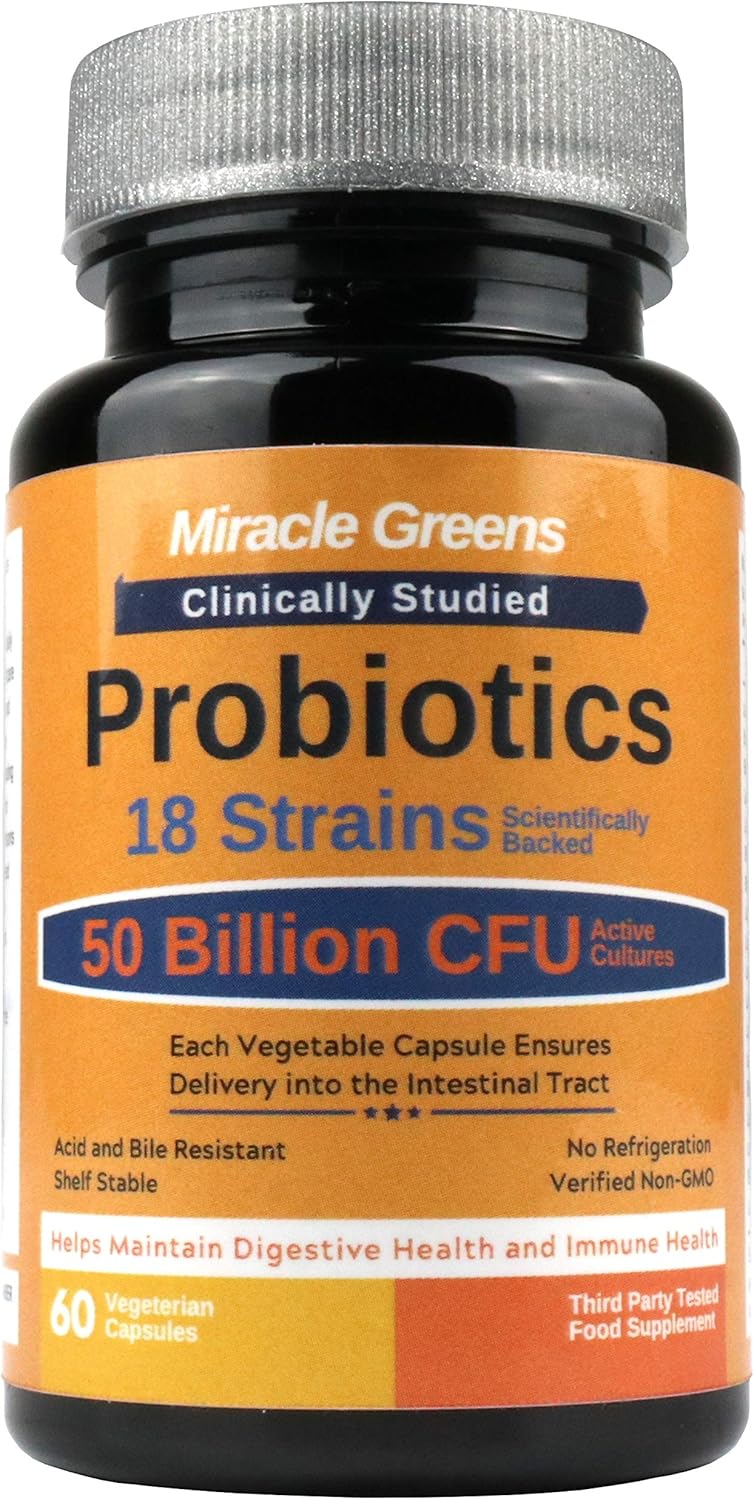
Powerful 50 Billion CFU Probiotics - 18 Strains, Stomach Acid Resistant, Shelf Stable | Highest Strength Bacterial Cultures – Keeps Digestive System Healthy | 60 Vegan Capsules for Men and Women
FREE Shipping
Powerful 50 Billion CFU Probiotics - 18 Strains, Stomach Acid Resistant, Shelf Stable | Highest Strength Bacterial Cultures – Keeps Digestive System Healthy | 60 Vegan Capsules for Men and Women
- Brand: Unbranded

Description
In rare cases, the bacteria or yeasts found in probiotics can enter the bloodstream and cause infections in susceptible individuals ( 41, 42, 43, 44). Some bacterial strains used in probiotic supplements can produce histamine inside the digestive tract of humans ( 19, 20, 21). However, the risk of developing an infection is very low, and no serious infections have been reported in clinical studies of the general population. Theoretically, they may want to select probiotic supplements that do not contain histamine-producing bacteria, but to date, there has been no research on this specific area. It is estimated that only about one in one million people who take probiotics containing Lactobacilli bacteria will develop an infection. The risk is even smaller for yeast-based probiotics, with only about one in 5.6 million users getting infected ( 48, 49).
Normally, histamine that is produced in your digestive tract is naturally degraded by an enzyme called diamine oxidase (DAO). This enzyme inhibits histamine levels from rising enough to cause symptoms ( 23). Probiotics are safe for the vast majority of the population, but may not be the best fit for everyone. The excess histamine is then absorbed through the lining of the intestinal tract and into the bloodstream, causing symptoms similar to an allergic reaction ( 27). Similarly, yeast-based probiotics should not be taken by those with yeast allergies. Instead, a bacteria-based probiotic should be used ( 33). While studies suggest that most people with lactose intolerance can tolerate up to 400 mg of lactose in medications or supplements, there have been case reports of adverse effects from probiotics ( 35, 36, 37).verifyErrors }}{{ message }}{{ /verifyErrors }}{{
Amines can excite the central nervous system, increase or decrease blood flow and may trigger headaches in people sensitive to the substance ( 15, 16).
There is no "right dose" of probiotics
When histamine levels rise, blood vessels dilate to bring more blood to the affected area. The vessels also become more permeable so that immune cells can easily get into the relevant tissue to combat any pathogens ( 22).
Some histamine-producing probiotic strains include Lactobacillus buchneri, Lactobacillus helveticus, Lactobacillus hilgardii and Streptococcus thermophilus ( 29, 30, 31). Summary When a supplement contains both probiotic microorganisms and prebiotic fibers, it is called a synbiotic ( 39) . This process creates redness and swelling in the affected area, and can also trigger allergy symptoms such as itching, watery eyes, runny nose or trouble breathing. When infections do occur, they typically respond well to traditional antibiotics or antifungals. However, in rare cases, deaths have occurred ( 48, 50). However, some people with histamine intolerance have trouble properly breaking down the histamine in their bodies, seeing as they do not produce enough DAO ( 24, 25, 26).
The verdict: Prebiotic and probiotic supplements
The most common amines found in probiotic-rich foods include histamine, tyramine, tryptamine and phenylethylamine ( 14). Research also suggests that people with severe acute pancreatitis should not take probiotics, as this may increase the risk of death ( 51). Summary Some people experience gas and bloating when consuming synbiotics. Those who experience these side effects may want to select a supplement that does not contain prebiotics ( 40). Summary If probiotic-rich foods trigger your symptoms, a probiotic supplement may be a better choice. Summary Biogenic amines are substances that form when protein-containing foods age or are fermented by bacteria ( 13).
Those at greatest risk for infection from probiotics include people with suppressed immune systems, prolonged hospitalizations, venous catheters or those who have undergone recent surgeries ( 45, 46, 47). In addition to containing powerful probiotics, some supplements also contain prebiotics. These are plant fibers that humans cannot digest, but that bacteria can consume as food. The most common types are lactulose, inulin and various oligosaccharides ( 38). Keeping a food diary including any headache symptoms you might experience can help clarify whether fermented foods are problematic for you. One study found that low-histamine diets reduced headaches in 75% of participants. However, a review of 10 controlled studies found no significant effect of dietary amines on headaches ( 17, 18).More research is needed to determine whether or not amines can be direct triggers of headaches or migraines in some people.
- Fruugo ID: 258392218-563234582
- EAN: 764486781913
-
Sold by: Fruugo
